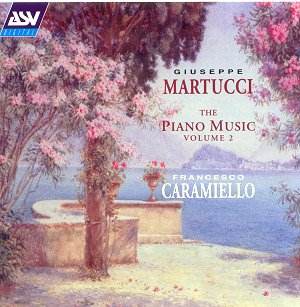Giuseppe Martucci (1856-1909)
The Piano Music, Volume 2.
Capriccio and Serenata, Op. 57. Fantasia, Op. 51. Two Nocturnes, Op. 70.
Capriccio and Toccata, Op. 77. Six Pieces, Op. 44.
 Francesco Caramiello
(piano).
Francesco Caramiello
(piano).
 ASV CDDCA1092 [DDD]
{78'18]
ASV CDDCA1092 [DDD]
{78'18]

Francesco Caramiello's advocacy of the piano music of Martucci is evident
from his enthusiastic and scholarly notes to this release. This is his second
volume of solo works (Volume One was on CDDCA897), in addition to which he
has put down the First Piano Concerto on CDDCA690 and the Second on CDDCA691.
Martucci made a conscious and determined effort to absorb Austro-Germanic
influences in his music: he was a pupil of Beniamino Cesi (a pupil of Thalberg)
and audible influences are, in particular, Liszt, Schumann and Mendelssohn.
Caramiello has all the requisite technical resource for this repertoire.
He brings out the Lisztian sonorities and figurations in the Capriccio
and Serenata, Op. 57, and seems to relish the deeply-rooted sonorities
of the extended (12 minutes) Fantasia, Op. 51. He is generous with
expression in the Two Nocturnes, Op. 70. It is only in the monochrome
sonorities of the Capriccio from Op. 77 that he seems to fall short.
The Six Pieces, Op. 44 (1879-81) see both Martucci and Caramiello
at their best. Liszt and Mendelssohn meet in the flighty second piece, 'Pezzo
fantastico', with Liszt coming to the fore in the final 'Tarantella' (although
it is much less manic than some of Liszt's efforts in this field). No. 3
is interesting from the viewpoint of its title, 'Pezzo orientale'. Rather
than presenting simple pastiche, Martucci takes the Oriental colouring into
his style to impressive effect.
Caramiello is both musical and capable of truly virtuoso feats, needing perhaps
only that extra bit of force of personality to do full justice. The piano
sound, on the thin side, lets him down a little.
Reviewer
Colin Clarke
Performance

Recording

Christopher Howell adds:-
The most remarkable music here is the latest, the Capriccio and Toccata
op.77. Martucci shows in the first an imaginative waywardness which harks
back to the spirit of Scarlatti or even Frescobaldi, yet couched in warmly
romantic harmonies and scintillating post-Lisztian piano writing. The
Toccata, instead of the motoric perpetuum mobile we might have expected,
is even more capricious than the Capriccio itself. We are fortunate
that Caramiello shows such a sure sense of where the music is heading.
The Capriccio from the op.57 pieces and the Fantasia exploit
the same vein with almost as much success (the themes themselves seem more
memorable in the op.77 pair) but it has to be said that when Martucci gets
in a rut he sticks hard and fast. For six-and-a-half long minutes the second
Nocturne proceeds without any variation in either its rhythmic movement
or its accompanimental figure; the Serenata and the Capriccio
from op.44 suffer slightly less from the same defect because the former
is more interesting harmonically and the latter has verve (and both are shorter),
but one day, just for the hell of it, I'm going to count the number of times
Martucci repeats his grotty little phrase in all the 10' 39" of Colore
orientale.
A very uneven composer, then, but the gold is definitely worth seeking out.
Caramiello is warm-toned and clean-fingered. With an equally warm recording
the piano sound is a pleasure in itself. A few doubts come with the first
Nocturne (the famous one). The various melodic strands in the texture
are not characterised by different tone qualities so when Caramiello wants
to bring out an inner line he can only play it louder, occasionally producing
hard tone. And the accompaniment sometimes gets in the way of the melody.
But I don't want to make too much of this. It's no use saying that his versions
of the op.77 pieces lack the diablerie of Horowitz, the impish humour
of Cherkassky or the aristocratic grace of Rubinstein when these masters
never played them. Fringe repertoire can finish in hands that do it more
harm than good and that is certainly not the case here. All the same, it
would be nice to hear what, say, Pletnev could do with op.77.
Caramiello also provides detailed and enthusiastic notes which appear in
English, French and German. So nothing stands seriously in the way of a strong
recommendation to all who wish to penetrate beyond the big names of romantic
pianism.
Christopher Howell

